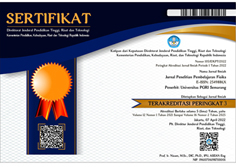Analisis Buku Ajar Termodinamika dengan Konsep Technological Pedagogical and Content Knowledge (TPACK) untuk Penguatan Kompetensi Belajar Mahasiswa
Abstract
Full Text:
PDFReferences
Suparno P 2007 Metode Pembelajaran Fisika (Yogyakarta: USD Press)
Hosnan M 2014 Pendekatan saintifik dan kontekstual dalam pembelajaran abad 21 (Bogor: Ghalia Indonesia)
Ismawati F Nugroho S E and Dwijananti P 2014 Application of Conceptul Understanding Procedures for Improving Student Curiousity and Understanding Concepts (Jurnal Pendidikan Indonesia) vol 10 no 1 22–27
Leonor J P 2015 Exploration of Conceptual Understanding and Science Process Skills: A Basis for Differentiated Science Inquiry Curriculum Model (International Journal Innovation in Engineering and Technology) vol 5 no 4 pp 255–260.
Brun M and Hinostroza J E 2014 Learning to Become a Teacher in the 21st Century: ICT Integration in Initial Teacher Education in Chile (Educational Technology & Society) vol 17 no 3 pp 222–238
Villagrasa S Fonseca D Redondo E and Duran J 2014 Teaching Case of Gamification and Visual Technologies for Education (Journal of Cases on Information Technology) vol 16 no 4 pp 38–57
Ertmer P A Ottenbreit-Leftwich A N 2010 Teacher Technology Change: How Knowledge, Confidence, Beliefs, and Culture Intersect (Journal of Research on Technology in Education) vol 42 no 3 pp 255–284
Webb C L and Kapavik R R 2011 Contextualizing Content Area Vocabulary: A 21st Century Approach (Journal of Content Area Reading) vol 9 no 1 pp 5–26
Baya N and Daher W 2015 The Development of College Instructors Technological Pedagogical and Content Knowledge (Procedia - Social and Behavioral Sciences) no 174 pp 1166–1175
Bektas O 2015 Pre-service Science Teachers ’ Pedagogical Content Knowledge in the Physics, Chemistry, and Biology Topics (European Journal of Physics Education) vol 6 no 2 pp 41–53
Bratley-Dias L and Ertmer P A 2013 Goldilocks and TPACK is the Construct “Just Right?†(Journal of Research on Technology in Education) vol 46 no 2 pp 103–128
Chai C S Koh J H L and Tsai C C 2013 A Review of Technological Pedagogical Content Knowledge (Educational Technology & Society) vol 16 no 1 31–51
Chua J H and Jamil H 2012 Factors Influencing the Technological Pedagogical Content Knowledge (TPACK) among TVET Instructors in Malaysian TVET Institution. (Procedia - Social and Behavioral Sciences) 69 (Iceepsy) pp 1539–1547.
Foulger T S Buss R R Wetzel K and Lindsey L A 2015 Instructors Growth in TPACK: Teaching Technology Infused Methods Courses to Preservice Teachers (Journal of Digital Learning in Teacher Education) vol 31 no 4 pp 134–147
Lyublinskaya I and Tournaki N 2016 Technological Pedagogical Content Knowledge (TPACK): Can this Type of Knowledge Transfer between Settings?
Mourlam D 2016 Developing Content Methods Faculty and Teacher Candidate Technological, Pedagogical, Content Knowledge of a Design-Based Approach
Young J R Young J L and Shaker Z 2012 Technological Pedagogical Content Knowledge (TPACK) Literature Using Confidence Intervals (Tech Trends) vol 56 no 5 pp 25–33
Rossenberg J M Koehler M J 2015 Context and Technological Pedagogical Content Knowledge (TPACK): A systematic review (Journal of Research on Technology in Education) vol 47 no 3 pp 186–210
Kutaka-kennedy J 2015 A Proposed Model to Increase Creativity, Collaboration and Accountability in the Online Classroom (International Journal Innovation in Engineering and Technology) vol 5 no 11 pp 873-876
Yazdani and Godbole V 2014 Relationship Between Achievement Motivation and Time Management with Academic Performance (Vidyabharati International Interdisciplinary Research Journal) vol 3 no 1 pp 1-12
Harris J Mishra P and Koehler M 2009 Teachers Technological Pedagogical Content Knowledge and Learning Activity Types: Curriculum based Technology Integration Reframed (Journal of Research on Technology in Education) vol 41 no 4 pp 393–416
Sears W F and Salinger L G 1980 Thermodynamics, Kinetic Theory, and Statistical Thermodynamics (New York: Addison-Wesley Publishing Company)
Sonntag R E Borgnakke C and Van Wylen G J 2003 Fundamental of Thermodynamics (Michigan: John wiley & Sons, inc)
Khuriati A 2009 Termodinamika.cetakan pertama (Graha Ilmu: Yogyakarta)
DOI: https://doi.org/10.26877/jp2f.v8i1.1330
Refbacks
- There are currently no refbacks.
Copyright (c) 2017 Jurnal Penelitian Pembelajaran Fisika

This work is licensed under a Creative Commons Attribution-ShareAlike 4.0 International License.
Attention:
Starting vol. 15 issue 4 October 2024 JP2F has moved to a new website address
https://journal2.upgris.ac.id/index.php/jp2f/index
The submission process will only be served on the web above.
Copyright of Jurnal Penelitian Pembelajaran Fisika ISSN 2086-2407 (print), ISSN 2549-886X (online)
Gedung Utama GU.2.01 FPMIPATI, Universitas PGRI Semarang
Jl. Lontar No. 1-Dr. Cipto, Kampus 1 UPGRIS, Semarang
Email: [email protected]









